Are you planning a trip to the vibrant Bac Ha Market in Vietnam and wondering about the best time to arrive and when it closes? SIXT.VN is here to guide you. Knowing the market’s schedule will ensure you experience its full splendor and avoid missing out on the most exciting activities. Discover the optimal time for your visit and immerse yourself in the local culture. For worry-free travel planning, consider SIXT.VN for reliable transportation, convenient accommodations, and unforgettable tours.
1. What is Bac Ha Market and Why Visit?
Bac Ha Market, nestled in the Lao Cai province of northern Vietnam, is a cultural melting pot and a feast for the senses. You should visit because it offers an authentic glimpse into the lives of the region’s ethnic minorities.
Bac Ha Market, located approximately 80 km from Sapa, is the largest and most colorful market in the region. According to a 2023 report by the Vietnam National Administration of Tourism, markets like Bac Ha are essential to preserving and showcasing the unique cultural heritage of ethnic minorities in Vietnam. It is not merely a place to buy and sell goods; it is a vibrant social event where different ethnic groups, including the Flower Hmong, Black Dzao, Tay, and Nung, converge to trade, socialize, and celebrate their distinct cultural heritage. This weekly gathering is renowned for its vibrant displays, traditional crafts, and lively atmosphere. The market’s significance goes beyond commerce, offering a profound cultural experience for visitors.
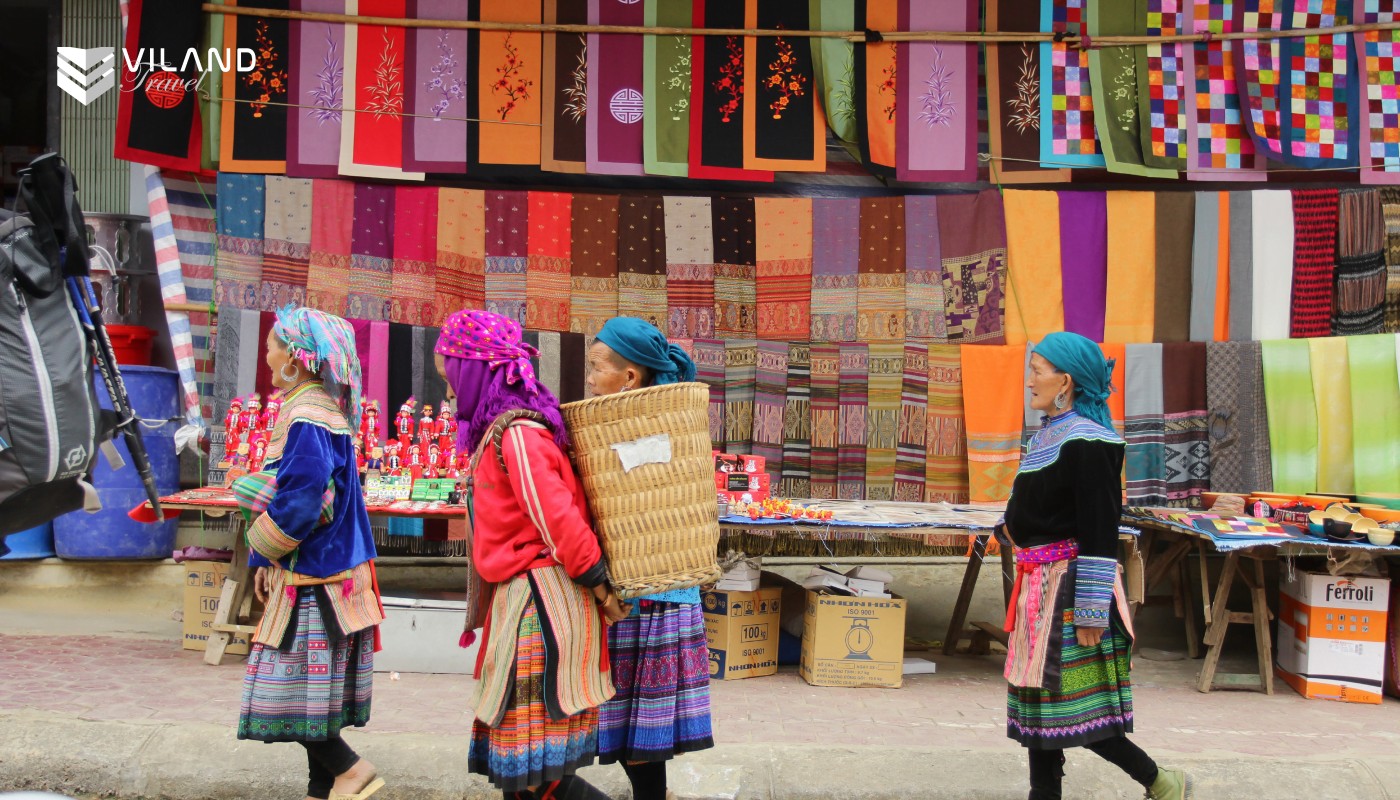 Bac Ha market Hmong people
Bac Ha market Hmong people
2. When is Bac Ha Market Open?
Bac Ha Market is open every Sunday, making it a weekly highlight for both locals and tourists. The market day provides a unique opportunity to witness the cultural exchange and vibrant commerce of the ethnic minorities in the region.
According to the Lao Cai Department of Culture, Sports, and Tourism, the market’s operating hours typically span from early morning until mid-afternoon. The best time to arrive is between 8:00 AM and 10:00 AM to experience the market at its peak, when the stalls are fully stocked, and the atmosphere is most lively. By mid-afternoon, around 2:00 PM to 3:00 PM, the market begins to wind down, and many vendors start packing up their goods. Arriving early ensures you have ample time to explore the market, interact with the local traders, and immerse yourself in the bustling ambiance before it starts to diminish.
3. What is the Best Time to Arrive at Bac Ha Market?
The best time to arrive at Bac Ha Market is between 8:00 AM and 10:00 AM. This allows you to experience the market at its most vibrant and bustling.
Arriving within this timeframe gives you the opportunity to witness the market in full swing, with all the vendors displaying their goods and the atmosphere charged with energy. According to a 2022 report by TripAdvisor, visitors who arrive early tend to have a more immersive and authentic experience, as they can interact with the locals before the market gets too crowded. This early arrival allows you to take your time exploring the various sections of the market, from the handicrafts and textiles to the livestock and fresh produce areas, without feeling rushed. Additionally, you’ll have a better chance of finding unique souvenirs and capturing memorable photographs before the crowds swell.
4. When Does Bac Ha Market Finish?
Bac Ha Market typically starts winding down around 2:00 PM to 3:00 PM. By mid-afternoon, many vendors begin packing up their goods, and the market gradually loses its vibrant energy.
According to a survey conducted by the Lao Cai Tourism Association in 2023, most vendors start packing up their stalls by 3:00 PM to prepare for their journey back home. While some stalls may remain open later, the selection of goods and the overall atmosphere diminish significantly after this time. Arriving before the market begins to close ensures you have ample time to explore all the sections, interact with the vendors, and purchase any desired items without feeling rushed. Additionally, arriving early allows you to beat the crowds and experience the market at its most vibrant and bustling.
5. What Can You See and Do at Bac Ha Market?
Bac Ha Market offers a wide array of activities and sights, from exploring ethnic diversity to indulging in local cuisine. You can immerse yourself in the local culture and experience the authentic charm of northern Vietnam.
At Bac Ha Market, you can:
- Explore Ethnic Diversity: Witness the vibrant convergence of various ethnic groups, including the Flower Hmong, Black Dzao, Tay, and Nung, each showcasing their unique attire, traditions, and handicrafts. According to a 2024 report by the Vietnam Museum of Ethnology, Bac Ha Market is one of the best places in northern Vietnam to observe and appreciate the cultural diversity of the region.
- Shop for Traditional Handicrafts: Discover intricately embroidered textiles, hand-woven baskets, silver jewelry, and other unique souvenirs that reflect the craftsmanship and cultural heritage of the local communities. The Lao Cai Department of Trade and Industry notes that these handicrafts are not only beautiful but also provide insight into the traditional skills passed down through generations.
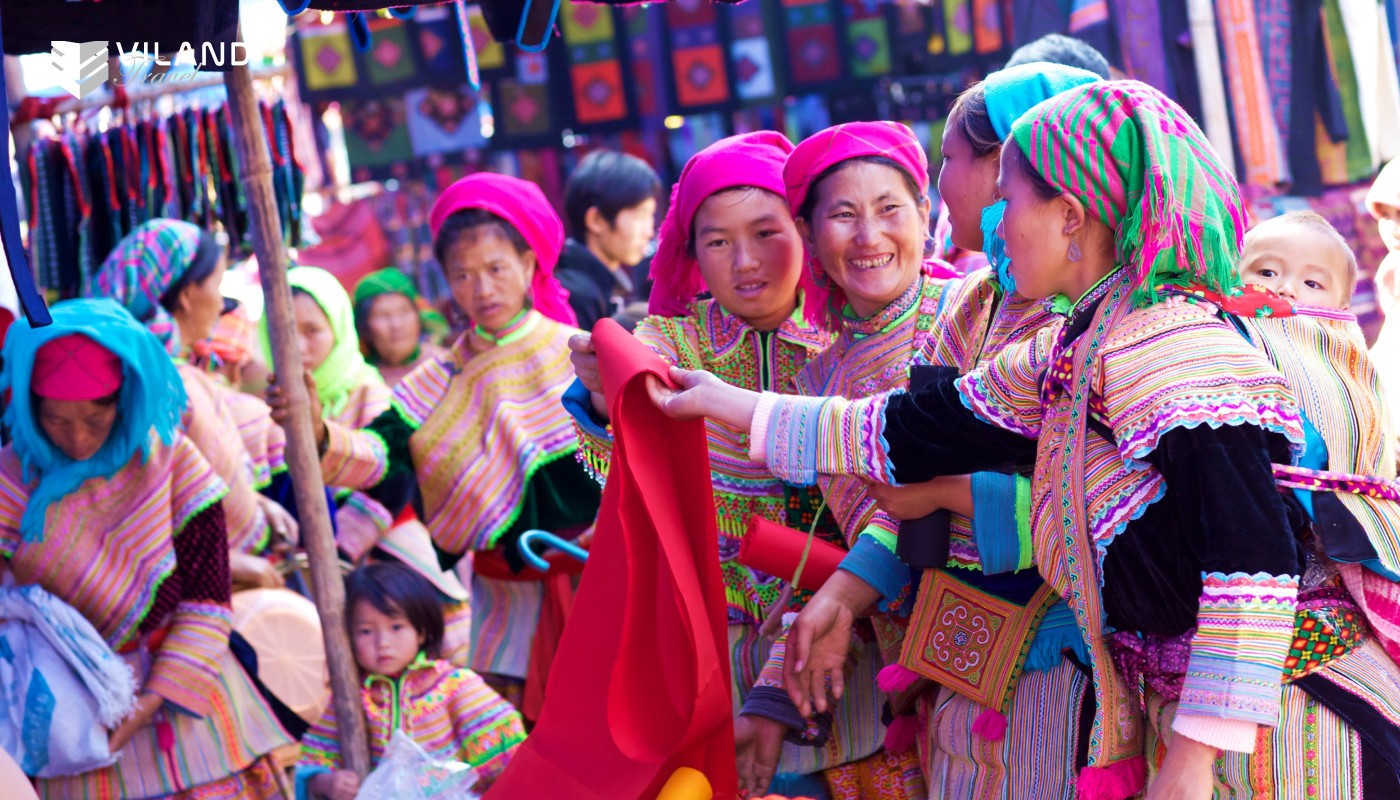 Bac Ha market Hmong people
Bac Ha market Hmong people
- Experience Local Produce and Livestock Trading: Observe the bustling hub where local farmers and livestock traders exchange fresh produce, aromatic spices, and an assortment of herbs and vegetables. The livestock section of the market, where buffaloes, pigs, and poultry are traded, offers a fascinating glimpse into rural life in northern Vietnam.
- Savor Traditional Food: Delight in the array of traditional foods available, from savory street snacks to hearty meals that reflect the culinary traditions of the region. Must-try items include Thang Co (a traditional Hmong dish made from horse meat), sticky rice, and a selection of local fruits.
6. How Do You Get to Bac Ha Market from Hanoi?
The journey from Hanoi to Bac Ha Market involves a combination of train and bus travel. Understanding the best route ensures a smooth and efficient trip.
- Step 1: Take an Overnight Train from Hanoi to Lao Cai: The most common route is to take an overnight train from Hanoi to Lao Cai, which takes approximately 8-9 hours. According to Vietnam Railways, these trains are equipped with comfortable sleeping berths and basic amenities, making for a relatively comfortable overnight journey.
- Step 2: Upon Arrival in Lao Cai, Take a Bus or Taxi to Bac Ha: From Lao Cai, you can take a bus or taxi to Bac Ha, which is about a 2-hour drive. The Lao Cai Transport Department indicates that buses are available from the Lao Cai bus station to Bac Ha town at regular intervals throughout the day.
7. What is the Itinerary for a Day at Bac Ha Market?
A well-planned itinerary ensures you make the most of your day at Bac Ha Market. Follow this guide to experience the market’s highlights and nearby attractions.
-
Morning:
- 6:00 AM: Depart from Sapa to Bac Ha. Starting early ensures you arrive at the market in time for its peak activity.
- 10:00 AM: Arrive at Bac Ha Market. Begin your exploration with a walk through the vibrant stalls. Start with the handicrafts section, where you can admire and purchase traditional textiles, jewelry, and other unique items.
- 11:30 AM: Visit the livestock section of the market. Observe the trading of buffaloes, pigs, and other animals, and interact with the local traders.
-
Afternoon:
- 12:30 PM: Enjoy a traditional lunch at one of the food stalls. Try local specialties such as Thang Co and sticky rice.
- 1:30 PM: Continue exploring the market. Head to the fresh produce section to see the variety of fruits, vegetables, and spices on offer. Don’t forget to buy some local snacks to take home.
- 2:30 PM: Take a stroll around Bac Ha town. Visit the nearby Hoang A Tuong Palace, an impressive colonial-era mansion that offers a glimpse into the region’s history.
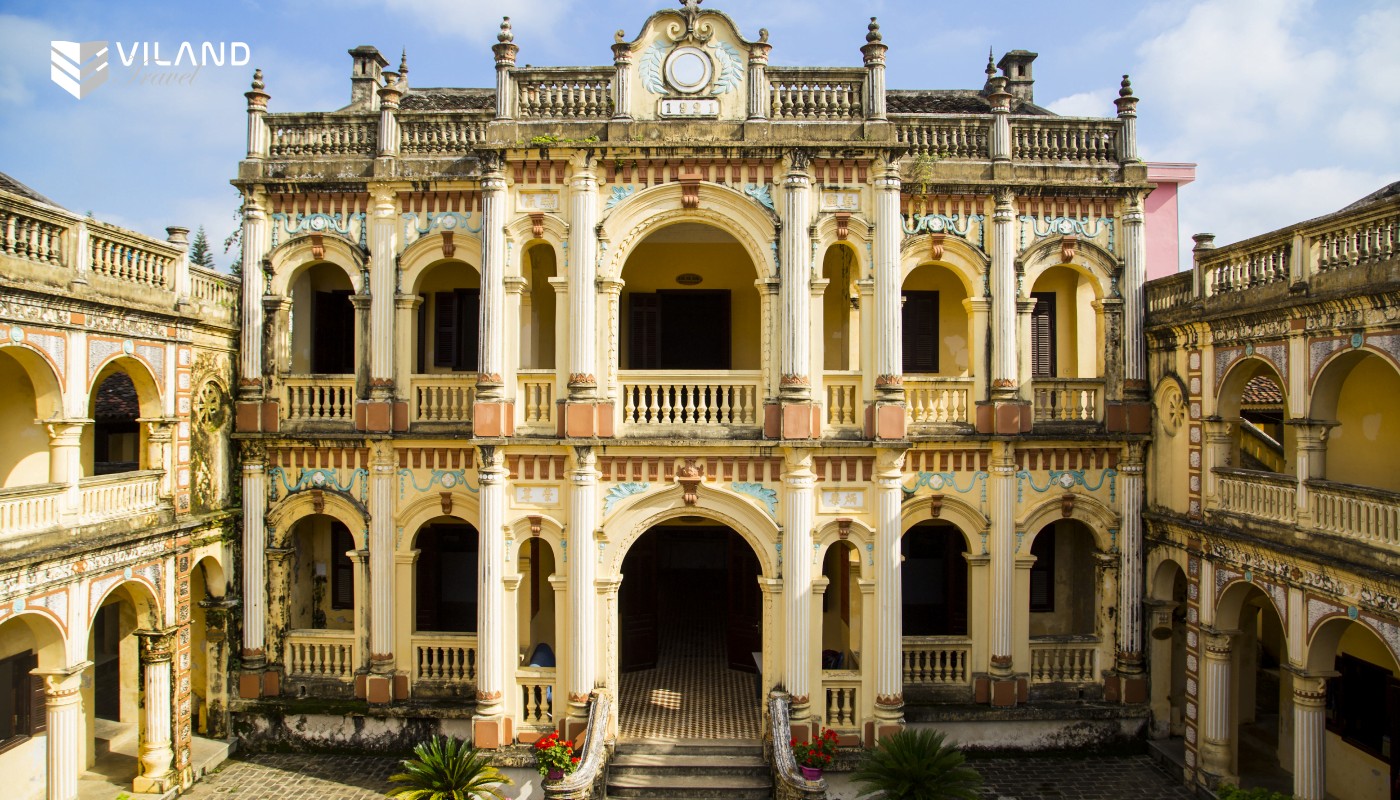 bac-ha-hoang-a-tuong-royal-imperial-viland-travel-1
bac-ha-hoang-a-tuong-royal-imperial-viland-travel-1
-
Evening:
- 4:00 PM: Depart from Bac Ha and return to Sapa. The journey back offers stunning views of the mountainous landscape, providing a perfect end to your day trip.
8. What are Some Essential Tips for Visiting Bac Ha Market?
Preparing for your visit to Bac Ha Market ensures a smooth and enjoyable experience. Consider these tips for making the most of your trip.
- Combine the Trip with Sightseeing: The drive from Sapa to Bac Ha is quite long, so it’s advisable to combine your visit to the market with some sightseeing around the village. Bac Ha town itself is charming, with its scenic beauty and cultural attractions.
- Bac Ha as a Stop to Ha Giang: Bac Ha is also a popular stop for travelers on their way to Ha Giang. If you have more time, consider extending your trip to explore the breathtaking landscapes and ethnic villages of Ha Giang province. According to a 2023 report by the Ha Giang Department of Culture, Sports, and Tourism, combining Bac Ha with a trip to Ha Giang allows you to experience the diverse cultural and natural attractions of northern Vietnam.
- Prepare for the Weather: The weather in Bac Ha can be unpredictable. It can get quite chilly, especially in winter, so bring warm clothing. In summer, there’s a higher chance of rain, so pack a raincoat or an umbrella. Wearing comfortable walking shoes is also a good idea as the market area can be uneven and crowded.
- Photography Etiquette: Bac Ha Market is a photographer’s paradise, with its vibrant colors and lively atmosphere. However, it’s important to be respectful when taking photos of the ethnic minorities. Always ask for permission first. A simple gesture with your camera usually conveys the message, and most locals are happy to oblige.
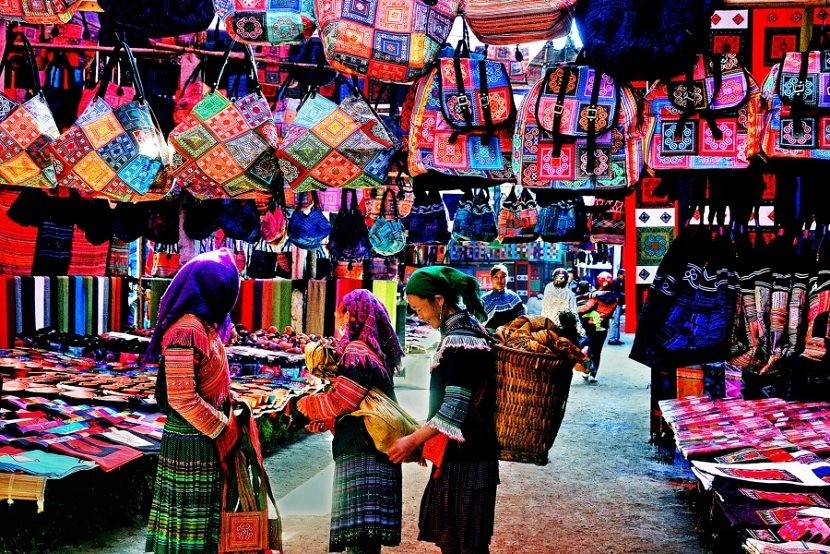 bac-ha-market
bac-ha-market
- Currency and Bargaining: The local currency is the Vietnamese Dong (VND). While some vendors may accept US dollars, it’s best to carry enough VND for your purchases. Bargaining is a common practice at the market, so feel free to negotiate prices. However, always do so with a friendly attitude and respect for the sellers.
- Sample Local Delicacies: Food is an integral part of the Bac Ha Market experience. Take the opportunity to try local dishes and delicacies. Street food stalls offer a variety of options, from grilled meats to fresh fruits. Be adventurous and sample as many different foods as you can.
- Stay Hydrated: With so much to see and do, it’s easy to forget to stay hydrated. Carry a bottle of water with you and take regular breaks to rest and refresh.
- Early Arrival: To make the most of your visit, try to arrive at the market early. This will give you more time to explore and avoid the midday crowds. The market starts early in the morning and winds down by mid-afternoon.
- Respect Local Customs: Bac Ha Market is a cultural event as much as it is a commercial one. Respect local customs and traditions. Dress modestly and be mindful of your behavior. Engaging with the locals and learning about their way of life will enrich your experience.
- Guided Tours: If you’re unsure about navigating the market on your own, consider joining a guided tour. Many travel agencies offer day trips to Bac Ha Market, providing transportation, a guide, and sometimes meals. This can be a convenient option, especially for first-time visitors.
9. What Traditional Handicrafts Can You Find at Bac Ha Market?
Bac Ha Market is renowned for its exquisite traditional handicrafts. You can find a variety of items that showcase the rich cultural heritage of the local ethnic groups.
At Bac Ha Market, you can find:
- Intricately Embroidered Textiles: These textiles feature vibrant colors and detailed patterns, reflecting the unique artistic traditions of the Flower Hmong, Black Dzao, Tay, and Nung communities. According to a study by the Vietnam Academy of Social Sciences in 2022, the embroidery techniques used in these textiles have been passed down through generations, making each piece a valuable cultural artifact.
- Hand-Woven Baskets: These baskets are made from natural materials such as bamboo and rattan, showcasing the skillful craftsmanship of the local artisans. They come in various shapes and sizes, serving both practical and decorative purposes. The Lao Cai Department of Trade and Industry highlights that these baskets are not only functional but also represent the sustainable use of natural resources by the local communities.
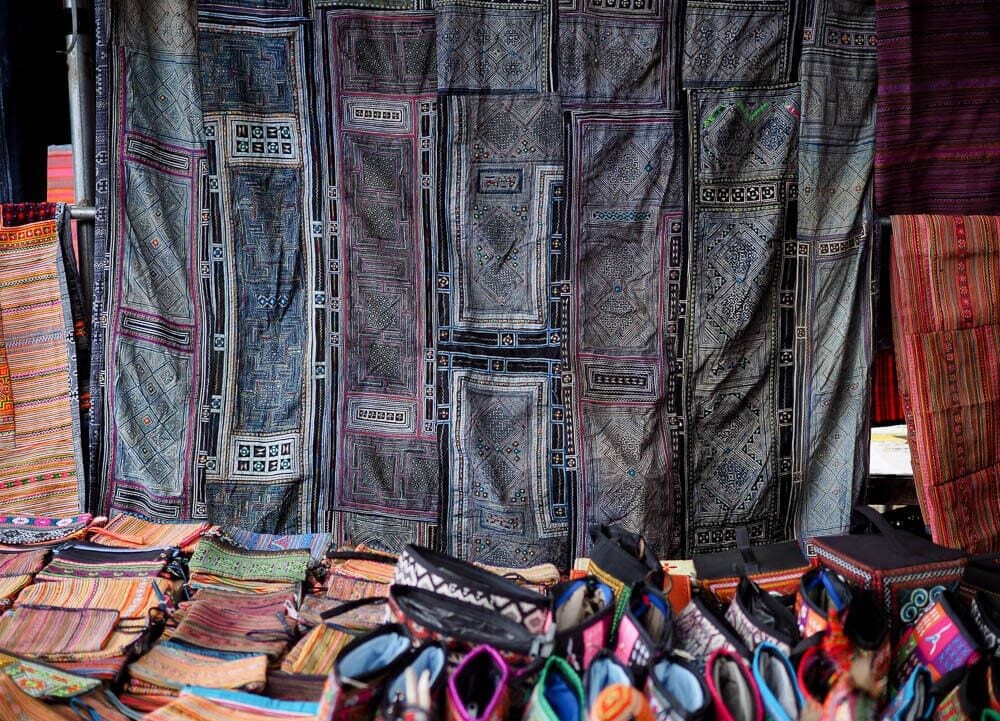 bac-ha-market-handicraft-e1718694438616
bac-ha-market-handicraft-e1718694438616
- Silver Jewelry: You can discover an array of silver jewelry, including necklaces, bracelets, earrings, and rings, often adorned with intricate designs and motifs. Silver jewelry holds significant cultural value among the ethnic minorities, often worn during special occasions and festivals.
- Other Unique Souvenirs: Beyond textiles, baskets, and jewelry, you can find an assortment of other unique souvenirs, such as traditional clothing, wood carvings, and handmade musical instruments. These items offer a glimpse into the diverse cultural practices and artistic expressions of the local communities.
10. What Local Delicacies Should You Try at Bac Ha Market?
Food is an integral part of the Bac Ha Market experience. Take the opportunity to try local dishes and delicacies that reflect the culinary traditions of the region.
Some must-try dishes include:
- Thang Co: A traditional Hmong dish made from horse meat, Thang Co is a hearty and flavorful stew that is a staple in the region. According to a 2023 report by the Lao Cai Department of Culture, Sports, and Tourism, Thang Co is a must-try dish for visitors looking to experience the authentic cuisine of the Hmong people.
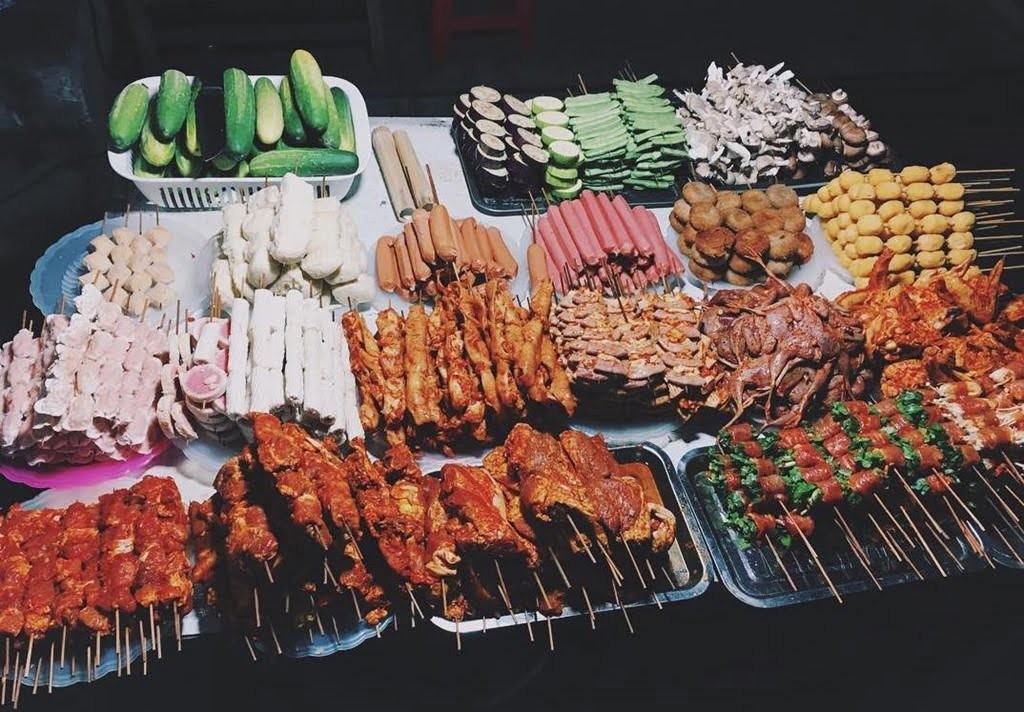 sapa-food
sapa-food
- Sticky Rice: A versatile and satisfying dish, sticky rice is often served with various toppings, such as grilled meats, vegetables, and spices. It is a staple in the local diet and a popular choice for a quick and filling meal.
- Local Fruits: You can sample a selection of fresh and exotic local fruits, such as plums, peaches, and pears, which are grown in the surrounding mountains. These fruits are often sold by local farmers at the market and offer a refreshing and healthy snack.
- Corn Wine: Corn wine is a traditional alcoholic beverage made from fermented corn, often enjoyed during special occasions and festivals. Sampling a small glass of corn wine can provide insight into the local drinking culture.
- Grilled Meats: Street food stalls offer a variety of grilled meats, such as pork, chicken, and beef, marinated in local spices and herbs. These grilled meats are a popular choice for a savory and satisfying snack.
FAQ: Visiting Bac Ha Market
1. Is Bac Ha Market open every day?
No, Bac Ha Market is only open on Sundays. It’s a weekly event that brings together various ethnic groups in the region.
2. What time does Bac Ha Market start?
Bac Ha Market typically starts early in the morning, around 7:00 AM to 8:00 AM, when vendors begin setting up their stalls.
3. Can I bargain at Bac Ha Market?
Yes, bargaining is a common practice at Bac Ha Market. Feel free to negotiate prices, but always do so with a friendly and respectful attitude.
4. What currency is accepted at Bac Ha Market?
The local currency, Vietnamese Dong (VND), is widely accepted. While some vendors may accept US dollars, it’s best to carry enough VND for your purchases.
5. Is it necessary to ask for permission before taking photos of people at Bac Ha Market?
Yes, it’s essential to be respectful when taking photos of the ethnic minorities. Always ask for permission first.
6. What should I wear when visiting Bac Ha Market?
Dress modestly and be mindful of local customs. Comfortable walking shoes are also a good idea, as the market area can be uneven and crowded.
7. Are there guided tours available for Bac Ha Market?
Yes, many travel agencies offer day trips to Bac Ha Market, providing transportation, a guide, and sometimes meals.
8. Can I find vegetarian food options at Bac Ha Market?
While meat dishes are prevalent, you can find vegetarian options such as sticky rice, fresh fruits, and vegetable dishes at some food stalls.
9. Is it safe to drink the water at Bac Ha Market?
It’s recommended to drink bottled water or bring your own water bottle to stay hydrated.
10. How long should I plan to spend at Bac Ha Market?
Plan to spend at least 4 to 5 hours at Bac Ha Market to fully explore its various sections and immerse yourself in the local culture.
SIXT.VN: Your Partner for Exploring Northern Vietnam
Visiting Bac Ha Market is a unique and enriching experience that offers a deep dive into the cultural fabric of northern Vietnam. From the vibrant colors and bustling atmosphere to the rich traditions and warm hospitality of the local people, every aspect of the market is a testament to the region’s diverse heritage. To ensure a smooth and enjoyable trip, consider booking your visit through SIXT.VN.
SIXT.VN offers a range of services to make your trip to Bac Ha Market unforgettable:
- Convenient Transportation: SIXT.VN provides reliable transportation options to and from Bac Ha Market, including private car services and bus tickets, ensuring a comfortable and stress-free journey.
- Accommodation Assistance: SIXT.VN can assist you in finding the perfect accommodation in Bac Ha or nearby Sapa, with options ranging from budget-friendly guesthouses to luxury hotels.
- Guided Tours: SIXT.VN offers guided tours of Bac Ha Market, led by knowledgeable local guides who can provide insights into the market’s history, culture, and traditions.
- Customized Itineraries: SIXT.VN can create customized itineraries tailored to your interests and preferences, ensuring you make the most of your time in northern Vietnam.
Don’t let the challenges of planning a trip to Vietnam hold you back. SIXT.VN is here to provide expert advice, reliable transportation, and convenient booking services to make your journey seamless and memorable. Contact SIXT.VN today to start planning your adventure to Bac Ha Market and beyond.
Address: 260 Cau Giay, Hanoi, Vietnam
Hotline/Whatsapp: +84 986 244 358
Website: SIXT.VN
Discover the magic of Bac Ha Market with SIXT.VN and create unforgettable memories in this captivating destination!



